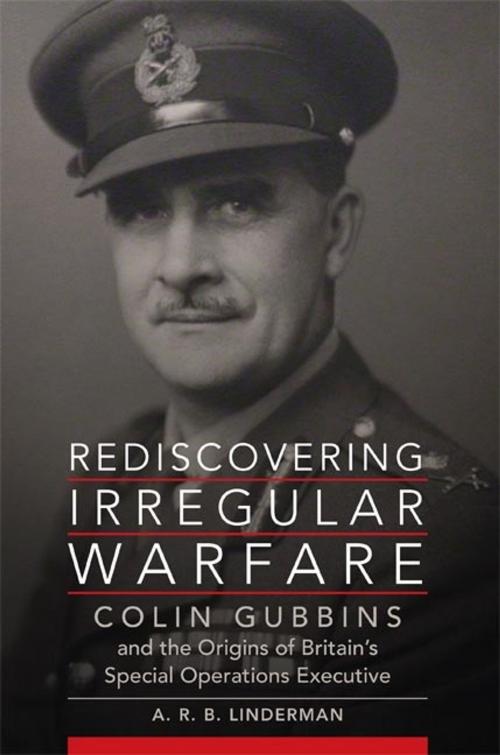Rediscovering Irregular Warfare
Colin Gubbins and the Origins of Britain's Special Operations Executive
Nonfiction, History, Military, Strategy, British, World War II| Author: | A. R. B. Linderman | ISBN: | 9780806155180 |
| Publisher: | University of Oklahoma Press | Publication: | February 29, 2016 |
| Imprint: | University of Oklahoma Press | Language: | English |
| Author: | A. R. B. Linderman |
| ISBN: | 9780806155180 |
| Publisher: | University of Oklahoma Press |
| Publication: | February 29, 2016 |
| Imprint: | University of Oklahoma Press |
| Language: | English |
Britain’s Special Operations Executive (SOE), which conducted sabotage campaigns and supported resistance movements in Axis-occupied Europe and in Asia, is often described as Winston Churchill’s brainchild. But as A. R. B. Linderman reveals in this engrossing history, the real genius behind Britain’s clandestine warriors was Colin Gubbins, a British officer who forged the SOE by drawing on lessons learned in irregular conflicts around the world. Following Gubbins through operations he studied and participated in, Linderman maps the evolution of the SOE from its origins to its doctrine to its becoming a critical institution. Part biography, part intellectual and organizational history, Rediscovering Irregular Warfare is the first book to explore the origins of a substantial force in the Allies’ victory in World War II.
Although popular history holds that Britain entered World War II with no prior knowledge of or experience with underground warfare, Rediscovering Irregular Warfare tells us otherwise. Linderman finds ample precedent in the clearly documented work of Gubbins and his fellow clandestine organizers. He traces Gubbins’s career from 1914 through World War I and such irregular conflicts as the Allied intervention in Russia, the Irish Revolution, and conflicts in British India. To these firsthand experiences, Gubbins added the insights of colleagues who had served with him and in Iraq, as well as what he learned from the Second Anglo-Boer War, the Arab Revolt led by T. E. Lawrence, the German guerrilla war in East Africa, the revolt in Palestine between the world wars, the Spanish Civil War, and the Second Sino-Japanese War. The two booklets that Gubbins wrote based on his accumulated knowledge offered the first synthesis of British unconventional warfare doctrine: practical guides that emphasized the centrality of local populations; the collection, protection, and use of intelligence; the necessity of cooperating with conventional forces; and the use of speed, surprise, and escape in ambush operations. In 1940, when Gubbins joined the newly created SOE, the experience and know-how codified in his guides formed the basis of Britain’s approach to irregular warfare.
The history of the SOE’s doctrinal origins is Colin Gubbins’s story. By telling that story, Rediscovering Irregular Warfare amplifies and clarifies our understanding of the Second World War—and of doctrines of unconventional warfare in the twentieth century.
Britain’s Special Operations Executive (SOE), which conducted sabotage campaigns and supported resistance movements in Axis-occupied Europe and in Asia, is often described as Winston Churchill’s brainchild. But as A. R. B. Linderman reveals in this engrossing history, the real genius behind Britain’s clandestine warriors was Colin Gubbins, a British officer who forged the SOE by drawing on lessons learned in irregular conflicts around the world. Following Gubbins through operations he studied and participated in, Linderman maps the evolution of the SOE from its origins to its doctrine to its becoming a critical institution. Part biography, part intellectual and organizational history, Rediscovering Irregular Warfare is the first book to explore the origins of a substantial force in the Allies’ victory in World War II.
Although popular history holds that Britain entered World War II with no prior knowledge of or experience with underground warfare, Rediscovering Irregular Warfare tells us otherwise. Linderman finds ample precedent in the clearly documented work of Gubbins and his fellow clandestine organizers. He traces Gubbins’s career from 1914 through World War I and such irregular conflicts as the Allied intervention in Russia, the Irish Revolution, and conflicts in British India. To these firsthand experiences, Gubbins added the insights of colleagues who had served with him and in Iraq, as well as what he learned from the Second Anglo-Boer War, the Arab Revolt led by T. E. Lawrence, the German guerrilla war in East Africa, the revolt in Palestine between the world wars, the Spanish Civil War, and the Second Sino-Japanese War. The two booklets that Gubbins wrote based on his accumulated knowledge offered the first synthesis of British unconventional warfare doctrine: practical guides that emphasized the centrality of local populations; the collection, protection, and use of intelligence; the necessity of cooperating with conventional forces; and the use of speed, surprise, and escape in ambush operations. In 1940, when Gubbins joined the newly created SOE, the experience and know-how codified in his guides formed the basis of Britain’s approach to irregular warfare.
The history of the SOE’s doctrinal origins is Colin Gubbins’s story. By telling that story, Rediscovering Irregular Warfare amplifies and clarifies our understanding of the Second World War—and of doctrines of unconventional warfare in the twentieth century.















